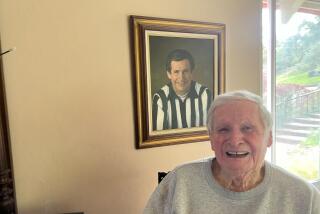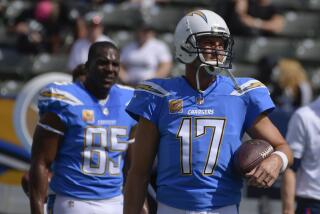Analysis : Flutie Misplaced in Coach’s Pocket
- Share via
Doug Flutie’s big problem as a pro quarterback could be that he and his new coach are incompatible.
They seemed so Sunday. The spring opener was a game that Flutie might have won if he had been authorized to play the first three quarters the way he played the fourth.
The coach, Walt Michaels of the New Jersey Generals, is a traditionalist who for nearly 43 of the 60 minutes attacked Birmingham with simple power runs. On the few passes he threw, Flutie was ordered to throw out of a pocket.
All of that handicapped Flutie repeatedly. By nature, he is an enthusiastic rollout passer who proved it in the final minutes, when he used his mobility to position himself where his 5-foot 9 3/4-inch height wouldn’t hurt him.
The philosophical difference:
--Flutie is most successful in a system in which passes are thrown to set up runs.
--Michaels is most comfortable when his team runs to set up passes. That’s what damaged Flutie in his pro debut. It was as if John McEnroe had been asked to play tennis right-handed.
Football teams led by short scramblers--including San Francisco’s Joe Montana--have found that rollout passes, quick screens, quick look-ins, quick hitch passes and running play-action passes on early downs work best.
Against Birmingham Sunday, the Generals called none of those above until they had fallen behind in the third quarter, 31-7.
For most of the way, obeying Michaels’ instructions, Flutie handed off for a couple of runs at the start of each series, after which, on third and long, he was asked to stand in a pocket and throw for first downs.
Football’s most experienced quarterbacks usually fail in those circumstances against the pass defense specialists brought in by modern teams. Not surprisingly, Flutie piled up a long string of incompletions.
At no time did Michaels even call the kind of quick flare pass that would have enabled his young quarterback to get a completion on the board in the first half.
“We always (did that) at Minnesota,” former quarterback Fran Tarkenton said recently. “That first completion--of any kind--does a lot for your team’s confidence.”
Instead, the Generals hung Flutie out to dry. His three-touchdown rally in the closing minutes, narrowing the final score to 38-28, was nothing but a manifestation of individual ability--Flutie’s and Herschel Walker’s.
Jack Bicknell, who coached Flutie to the Heisman Trophy last fall at Boston College, was neither surprised nor discouraged by the result.
“Doug is accustomed to throwing on first down,” Bicknell said. “He’s used to not getting caught where he’s got to throw on passing downs. When (the Generals) see what Doug can do, they’ll adjust to him. After all, he’s only been there two weeks.”
Asked to describe the offense in which Flutie has played for the last four years as a college quarterback, Bicknell said:
“We believe in the forward pass. We come out of the tunnel throwing. Our style is to throw on first and second down using motion and a bunch of formations. But we don’t just throw--we look for ways to get the running game going, too, after the pass is established.”
This approach could hardly be more different from Michaels’. One of the first things Michaels told the young quarterback was: “We don’t scramble on this team.”
Said Bicknell: “Doug is coachable. The best thing about him--except his vision and his ability to throw hard and accurately--is that he’s such a great kid. If they want him to be a pocket passer, he’ll try to be a pocket passer.
“I’m not criticizing (the Generals),” Bicknell said. “How could I? I know nothing of their problems. But I know Flutie, and I know he works best when he’s attacking the defense on early downs instead of them attacking him on third down. That goes for most passers.”
As a pro, will Flutie make good eventually?
“He’ll make it big,” Bicknell said. “The pressure on him right now is tremendous, and he isn’t a miracle worker, but Doug never gets down on himself.
“A lot of passers would have been shellshocked by Doug’s 0-for-9 start (as a passer Sunday). But not him. He kept playing. He kept coming.”
It is often said of San Francisco’s Super Bowl champions that Montana is Bill Walsh’s kind of quarterback.
The implication is that Walsh couldn’t win without a great rollout passer.
That’s hardly the case. It was Walsh who developed, among others, San Diego’s pocket passer, Dan Fouts.
If, as it seems, Walsh is on his way to recognition as football’s coach of the 1980s, one reason is that he adjusts to great ability wherever he finds it--particularly at quarterback.
Or as he said: “You can help a quarterback. You can’t create one.”
The Generals could easily adjust to the kind of quarterback they have in Flutie. All professional teams could. All have San Francisco’s capability to operate all kinds of plays. It’s just a matter of what they want to call.
Here are some of the ways the Generals might have gained ground in the first half Sunday but didn’t until the final 17 minutes:
--Flutie’s first completion: a quick, short, first-down hitch pass. He completed it the first time they called it.
--A quick rollout pass on the next play. This made Flutie 2 for 2 after 0 for 9. It was also the first play of its kind the Generals called.
--Flutie’s 50-yard pass down the middle to Herschel Walker. It was the Generals’ first bomb to their best receiver.
--Walker’s diving catch of a deflected pass setting up a touchdown.
Although Walker doubtlessly looked lucky to some viewers, he is an accomplished receiver. He can make such plays. So can Flutie. In the right system, they have a future.
More to Read
Go beyond the scoreboard
Get the latest on L.A.'s teams in the daily Sports Report newsletter.
You may occasionally receive promotional content from the Los Angeles Times.










